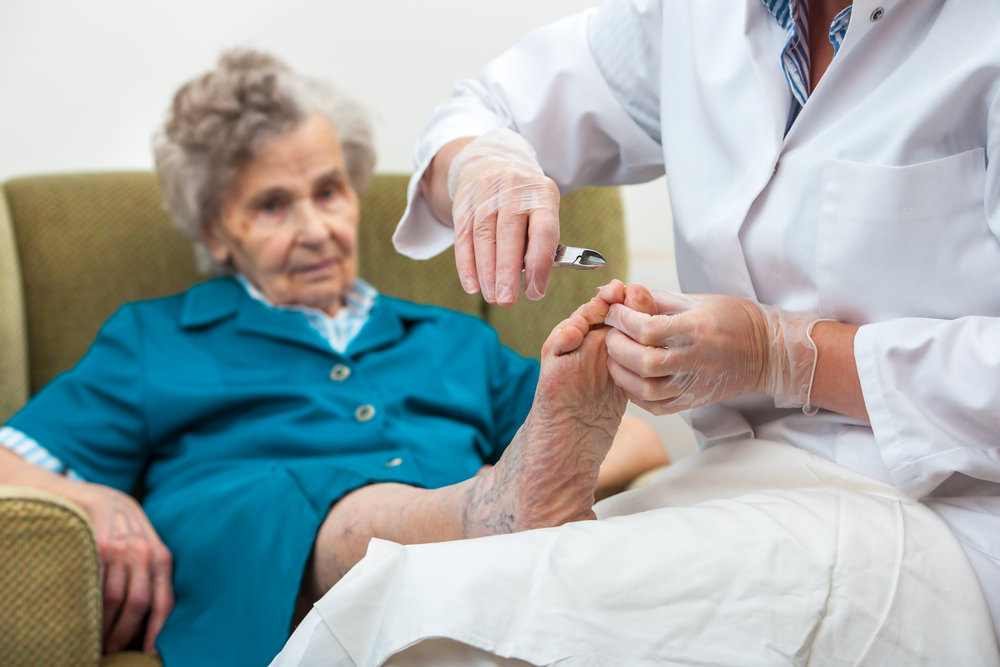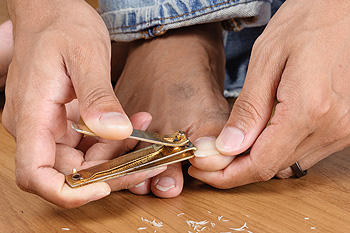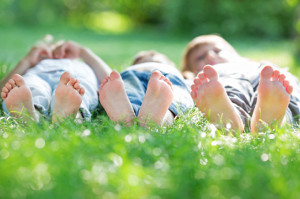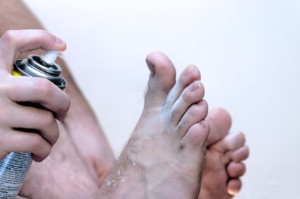September 2019
Diabetic Foot Ulcers
 Wounds on the feet may be common for patients who are diabetic. This may be a result of decreased sensitivity in the feet that can come from neuropathy. It may be difficult to feel if there are any cuts or scrapes on the feet, and this can possibly cause extreme danger to the health of the foot. If any existing wounds become infected, they can progress to a foot ulcer. If it is left untreated, it may lead to amputation. There are methods that can be implemented which may help to reduce the possibility of an infection. These can include properly trimming the toenails, and performing a daily foot check to look for cuts or blisters. If you are diabetic, it is strongly suggested that you are under the care of a podiatrist who can help you to manage your diabetic condition.
Wounds on the feet may be common for patients who are diabetic. This may be a result of decreased sensitivity in the feet that can come from neuropathy. It may be difficult to feel if there are any cuts or scrapes on the feet, and this can possibly cause extreme danger to the health of the foot. If any existing wounds become infected, they can progress to a foot ulcer. If it is left untreated, it may lead to amputation. There are methods that can be implemented which may help to reduce the possibility of an infection. These can include properly trimming the toenails, and performing a daily foot check to look for cuts or blisters. If you are diabetic, it is strongly suggested that you are under the care of a podiatrist who can help you to manage your diabetic condition.
Diabetic foot care is important in preventing foot ailments such as ulcers. If you are suffering from diabetes or have any other concerns about your feet, contact John Killough, DPM from Regional Foot Center. Our doctor can provide the care you need to keep you pain-free and on your feet.
Diabetic Foot Care
Diabetes affects millions of people every year. The condition can damage blood vessels in many parts of the body, especially the feet. Because of this, taking care of your feet is essential if you have diabetes, and having a podiatrist help monitor your foot health is highly recommended.
The Importance of Caring for Your Feet
- Routinely inspect your feet for bruises or sores.
- Wear socks that fit your feet comfortably.
- Wear comfortable shoes that provide adequate support.
Patients with diabetes should have their doctor monitor their blood levels, as blood sugar levels play such a huge role in diabetic care. Monitoring these levels on a regular basis is highly advised.
It is always best to inform your healthcare professional of any concerns you may have regarding your feet, especially for diabetic patients. Early treatment and routine foot examinations are keys to maintaining proper health, especially because severe complications can arise if proper treatment is not applied.
If you have any questions please feel free to contact our offices located in Charleston and Effingham, IL . We offer the newest diagnostic and treatment technologies for all your foot and ankle needs.
Proper Foot Care May Prevent Painful Foot Conditions
 The time one takes to care for the feet daily is possibly connected to preventing specific foot conditions from developing. It is beneficial to wear shoes that fit correctly, and they must provide adequate room for the toes to move freely in. This may be helpful in preventing bunions and hammertoes. Flip flops and high heels may be desirable to wear, but research has shown they may be harmful to the feet. Ingrown toenails may be avoided by frequently trimming the toenails straight across the toe. When the feet are washed and dried daily, the uncomfortable condition that is known as athlete’s foot may be avoided. Additionally, the feet will feel good when a moisturizer is applied, and this may be helpful in preventing cracked heels. Consulting with a podiatrist can be beneficial in acquiring additional knowledge about how to properly take care of your feet.
The time one takes to care for the feet daily is possibly connected to preventing specific foot conditions from developing. It is beneficial to wear shoes that fit correctly, and they must provide adequate room for the toes to move freely in. This may be helpful in preventing bunions and hammertoes. Flip flops and high heels may be desirable to wear, but research has shown they may be harmful to the feet. Ingrown toenails may be avoided by frequently trimming the toenails straight across the toe. When the feet are washed and dried daily, the uncomfortable condition that is known as athlete’s foot may be avoided. Additionally, the feet will feel good when a moisturizer is applied, and this may be helpful in preventing cracked heels. Consulting with a podiatrist can be beneficial in acquiring additional knowledge about how to properly take care of your feet.
Everyday foot care is very important to prevent infection and other foot ailments. If you need your feet checked, contact John Killough, DPM from Regional Foot Center. Our doctor can provide the care you need to keep you pain-free and on your feet.
Everyday Foot Care
Often, people take care of their bodies, face and hair more so than they do for their feet. But the feet are a very important aspect of our bodies, and one that we should pay more attention to. Without our feet, we would not be able to perform most daily tasks.
It is best to check your feet regularly to make sure there are no new bruises or cuts that you may not have noticed before. For dry feet, moisturizer can easily be a remedy and can be applied as often as necessary to the affected areas. Wearing shoes that fit well can also help you maintain good foot health, as well as making it easier to walk and do daily activities without the stress or pain of ill-fitting shoes, high heels, or even flip flops. Wearing clean socks with closed shoes is important to ensure that sweat and bacteria do not accumulate within the shoe. Clean socks help to prevent Athlete’s foot, fungi problems, bad odors, and can absorb sweat.
If you have any questions please feel free to contact our offices located in Charleston and Effingham, IL . We offer the newest diagnostic and treatment technologies for all your foot and ankle needs.
How Important Is Proper Foot Care In Children?
 Research has indicated when children's feet receive proper care, potential foot problems that can develop as adults may diminish. When children get into the habit of washing and drying their feet on a daily basis, foot conditions, including athlete’s foot, may be prevented. Children’s feet will benefit from walking barefoot while indoors. This helps the toes to become strong by grasping the floor. When it is time to walk outdoors, it is important to have your child’s feet properly measured. This can help to determine the correct size shoe to ensure comfortable walking. The unpleasant foot condition, known as ingrown toenails, may be prevented when the toenails are trimmed straight across the toe. Please consult with a podiatrist if you would like additional information about foot care for children.
Research has indicated when children's feet receive proper care, potential foot problems that can develop as adults may diminish. When children get into the habit of washing and drying their feet on a daily basis, foot conditions, including athlete’s foot, may be prevented. Children’s feet will benefit from walking barefoot while indoors. This helps the toes to become strong by grasping the floor. When it is time to walk outdoors, it is important to have your child’s feet properly measured. This can help to determine the correct size shoe to ensure comfortable walking. The unpleasant foot condition, known as ingrown toenails, may be prevented when the toenails are trimmed straight across the toe. Please consult with a podiatrist if you would like additional information about foot care for children.
Making sure that your children maintain good foot health is very important as they grow. If you have any questions, contact John Killough, DPM of Regional Foot Center. Our doctor can provide the care you need to keep you pain-free and on your feet.
Keeping Children's Feet Healthy
Having healthy feet during childhood can help prevent medical problems later in life, namely in the back and legs. As children grow, their feet require different types of care. Here are some things to consider...
Although babies do not walk yet, it is still very important to take care of their feet.
Avoid putting tight shoes or socks on his or her feet.
Allow the baby to stretch and kick his or her feet to feel comfortable.
As a toddler, kids are now on the move and begin to develop differently. At this age, toddlers are getting a feel for walking, so don’t be alarmed if your toddler is unsteady or ‘walks funny’.
As your child gets older, it is important to teach them how to take care of their feet.
Show them proper hygiene to prevent infections such as fungus.
Be watchful for any pain or injury.
Have all injuries checked by a doctor as soon as possible.
Comfortable, protective shoes should always be worn, especially at play.
If you have any questions please feel free to contact our offices located in Charleston and Effingham, IL . We offer the newest diagnostic and treatment technologies for all your foot and ankle needs.
Possible Causes of Athlete’s Foot
 The medical term for athlete’s foot is known as tinea pedis. It is a condition that affects the feet, and is caused by a fungus. Many patients notice symptoms of this condition between the toes and on the bottom of the feet, which often include severe itchiness and a burning sensation. The fungus of this contagious ailment lives and thrives in warm and moist environments. These can include public swimming pools, shower room floors, and surrounding areas. To avoid getting this uncomfortable condition, it is important to wear appropriate shoes while in these areas. Additionally, it is beneficial to wear clean shoes and socks, and it will also help to keep the toenails trimmed. Relief may be found while using an antifungal spray on the affected areas. For more severe cases, it is suggested that you speak to a podiatrist who can offer proper treatment options, which may include medication.
The medical term for athlete’s foot is known as tinea pedis. It is a condition that affects the feet, and is caused by a fungus. Many patients notice symptoms of this condition between the toes and on the bottom of the feet, which often include severe itchiness and a burning sensation. The fungus of this contagious ailment lives and thrives in warm and moist environments. These can include public swimming pools, shower room floors, and surrounding areas. To avoid getting this uncomfortable condition, it is important to wear appropriate shoes while in these areas. Additionally, it is beneficial to wear clean shoes and socks, and it will also help to keep the toenails trimmed. Relief may be found while using an antifungal spray on the affected areas. For more severe cases, it is suggested that you speak to a podiatrist who can offer proper treatment options, which may include medication.
Athlete’s Foot
Athlete’s foot is often an uncomfortable condition to experience. Thankfully, podiatrists specialize in treating athlete’s foot and offer the best treatment options. If you have any questions about athlete’s foot, consult with John Killough, DPM from Regional Foot Center. Our doctor will assess your condition and provide you with quality treatment.
What Is Athlete’s Foot?
Tinea pedis, more commonly known as athlete’s foot, is a non-serious and common fungal infection of the foot. Athlete’s foot is contagious and can be contracted by touching someone who has it or infected surfaces. The most common places contaminated by it are public showers, locker rooms, and swimming pools. Once contracted, it grows on feet that are left inside moist, dark, and warm shoes and socks.
Prevention
The most effective ways to prevent athlete’s foot include:
- Thoroughly washing and drying feet
- Avoid going barefoot in locker rooms and public showers
- Using shower shoes in public showers
- Wearing socks that allow the feet to breathe
- Changing socks and shoes frequently if you sweat a lot
Symptoms
Athlete’s foot initially occurs as a rash between the toes. However, if left undiagnosed, it can spread to the sides and bottom of the feet, toenails, and if touched by hand, the hands themselves. Symptoms include:
- Redness
- Burning
- Itching
- Scaly and peeling skin
Diagnosis and Treatment
Diagnosis is quick and easy. Skin samples will be taken and either viewed under a microscope or sent to a lab for testing. Sometimes, a podiatrist can diagnose it based on simply looking at it. Once confirmed, treatment options include oral and topical antifungal medications.
If you have any questions, please feel free to contact our offices located in Charleston and Effingham, IL . We offer the newest diagnostic and treatment technologies for all your foot care needs.







